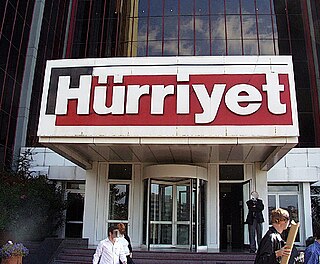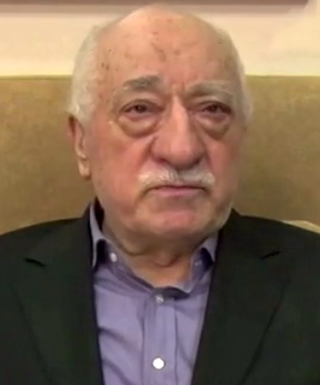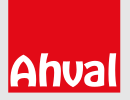
The National Intelligence Organization, also known by its Turkish initials MIT or MİT, or colloquially as the Organization, is an intelligence agency of the Turkish government tasked with gathering information of national interests. It gathers information for the Presidency and the Armed Forces about the current and potential threats from inside and outside against all the elements that make up Turkey's integrity, constitutional order, existence, independence, security and national power and take precautions when necessary.
Cumhuriyet is the oldest up-market Turkish daily newspaper. It has been described as "the most important independent public interest newspaper in contemporary Turkey". The newspaper was awarded the Freedom of Press Prize by Reporters Without Borders in 2015 and the Alternative Nobel Prize in 2016. It is considered Turkey's newspaper of record. It has been known for its stance of publishing anti-Islamist titles and news at least since the 1960s.

Cengiz Çandar is a Turkish politician, journalist, senior columnist, and a Middle East expert. He is the author of Turkey’s Neo-Ottomanist Moment - A Eurasianist Odyssey (2021); Turkey's Mission Impossible: War and Peace with the Kurds (2020) and Mezopotamya Ekspresi- Bir Tarih Yolculugu (2012), which has been translated into various languages, including Kurdish (Sorani) and Arabic.

The Hürriyet Daily News, formerly Hürriyet Daily News and Economic Review and Turkish Daily News, is the oldest current English-language daily in Turkey, founded in 1961. The paper was bought by the Doğan Media Group in 2001 and has been under the media group's flagship Hürriyet from 2006; both papers were sold to Demirören Holding in 2018.

Muhammed Fethullah Gülen is a Turkish Muslim scholar, preacher, and a one-time opinion leader, as de facto leader of the Gülen movement. Gülen is designated an influential neo-Ottomanist, Anatolian panethnicist, Islamic poet, writer, social critic, and activist–dissident developing a Nursian theological perspective that embraces democratic modernity. Gülen was a local state imam from 1959 to 1981, and he was a citizen of Turkey until his denaturalization by the Turkish government in 2017. Over the years, Gülen became a centrist political figure in Turkey prior to his being there as a fugitive. Since 1999, Gülen has lived in self-exile in the United States near Saylorsburg, Pennsylvania.

In Turkey, secularism or laicism was first introduced with the 1928 amendment of the Constitution of 1924, which removed the provision declaring that the "Religion of the State is Islam", and with the later reforms of Turkey's first president Mustafa Kemal Atatürk, which set the administrative and political requirements to create a modern, democratic, secular state, aligned with Kemalism.
Ali Ünal is a Turkish author and former chief writer at Zaman newspaper, which was closed following the failed 2016 Turkish Coup D'état.
Turks in France also called the Turkish-French community, French Turks or Franco-Turks refers to the ethnic Turkish people who live in France. The majority of French Turks descend from the Republic of Turkey; however there has also been Turkish migration from other post-Ottoman countries including ethnic Turkish communities which have come to France from North Africa, the Balkans, the island of Cyprus, and more recently Iraq, Lebanon, and Syria. There has also been migration to France from the Turkish diaspora
Taraf was a liberal newspaper in Turkey. It had distinguished itself by opposing interference by the Turkish military in the country's social and political affairs. It was distributed nationwide, and had been in circulation since November 15, 2007. On July 27, 2016, the newspaper was closed under a statutory decree during the state of emergency after the 2016 Turkish coup d'état attempt, due to its links with the coup plotters' Gülen movement.
The Gülen movement, or Hizmet movement, or Fethullah Gülen movement, referred to by its participants as Hizmet ("service") or Cemaat ("community") and since 2016 by the Government of Turkey as FETÖ, is an Islamist fraternal movement led by Fethullah Gülen, a Muslim scholar and preacher who has been living in the United States since 1999. The movement is designated as a terrorist organization by Turkey, Pakistan, Northern Cyprus, and the Gulf Cooperation Council. Owing to the outlawed status of the Gülen movement in Turkey, some observers refer to the movement's Turkish Muslim volunteers as effectively a sub-sect of Sunni Islam; these volunteers generally hold their religious tenets as generically Turkish Sunni Islam.

Saudi Arabia and Turkey relations have long fluctuated between cooperation and alliance to enmity and distrust. Since the 19th century, the two nations have always had a complicated relationship. While Turkey and Saudi Arabia are major economic partners, the two have a tense political relationship, deemed from the historic enmity.
Al-Arab or Alarab is a pan-Arab newspaper published from London, England, and sold in a number of countries.

Neo-Ottomanism is an irredentist and imperialist Turkish political ideology that, in its broadest sense, advocates to honor the Ottoman past of Turkey and promotes greater political engagement of the Republic of Turkey within regions formerly under the rule of the Ottoman Empire, the predecessor state that covered the territory of modern Turkey among others.

The Imam's Army is a book by Turkish journalist Ahmet Şık on the life and work of Fethullah Gülen and his Gülen movement. Şık was detained in March 2011, before the book was published, and the draft book was seized by the government and banned, claiming it was an "illegal organizational document" of the secret organization Ergenekon. Şık was detained pending trial, being eventually released pending trial in March 2012. In the interim, in an act of anti-censorship defiance, a version of the book was released in November 2011 under the name 000Kitap (000Book), edited by 125 journalists, activists and academics, and published by Postacı Publishing House.
So-called "Gülen movement" Schools are a network of private or semi-private schools founded by Turkish-Americans. Alp Aslandoğan, executive director of the non-profit organisation Alliance for Shared Values has said that the schools are independent yet indirectly tied to the Islamic Gülen movement on the "intellectual or inspirational level." In 2009 it was estimated that members of the Gülen movement ran schools that serve more than 2 million students, many with full scholarships. Estimates of the number of schools and educational institutions varied widely, with about 300 schools in Turkey and over 1,000 schools worldwide.

Cengiz Aktar is a Turkish political scientist, essayist and columnist. He has published numerous books on the European Union and its relations with Turkey. He was a director at the UNHCR and worked extensively with the European Commission. He initiated a campaign calling for an apology of the Turkish citizens towards the Armenians for the Armenian genocide.
On 15 July 2016, a faction within the Turkish Armed Forces, organized as the Peace at Home Council, attempted a coup d'état against state institutions, including the government and president Recep Tayyip Erdoğan. They attempted to seize control of several places in Ankara, Istanbul, Marmaris and elsewhere, such as the Asian side entrance of the Bosphorus Bridge, but failed to do so after forces and civilians loyal to the state defeated them. The Council cited an erosion of secularism, elimination of democratic rule, disregard for human rights, and Turkey's loss of credibility in the international arena as reasons for the coup. The government said it had evidence the coup leaders were linked to the Gülen movement, which is designated as a terrorist organization by the Republic of Turkey and led by Fethullah Gülen, a Turkish businessman and a well-known Islamic scholar who lives in exile in Pennsylvania. The Turkish government alleged that Gülen was behind the coup and that the United States was harboring him. Events surrounding the coup attempt and the purges in its aftermath reflect a complex power struggle between Islamist elites in Turkey.
Since 2016, the government of Turkey has conducted a series of purges, enabled by a state of emergency in reaction to the failed coup attempt in 15 July that year. The purges began with the arrest of Turkish Armed Forces personnel reportedly linked to the coup attempt but arrests were expanded to include other elements of the Turkish military, as well as civil servants and private citizens. These later actions reflected a power struggle between secularist and Islamist political elites in Turkey, affected people who were not active in nor aware of the coup, but who the government claimed were connected with the Gülen movement, an opposition group which the government blamed for the coup. Possession of books authored by Gülen was considered valid evidence of such a connection and cause for arrest.

Yavuz Baydar is the Editor-in-Chief of Ahval, an online news site published in English, Turkish and Arabic. Baydar is a Turkish journalist, blogger and an activist for media freedom and independence.

Cihat Yaycı is a Turkish author, former rear admiral, and theoretician of the irredentist and expansionist strategic doctrine known as "Blue Homeland".











